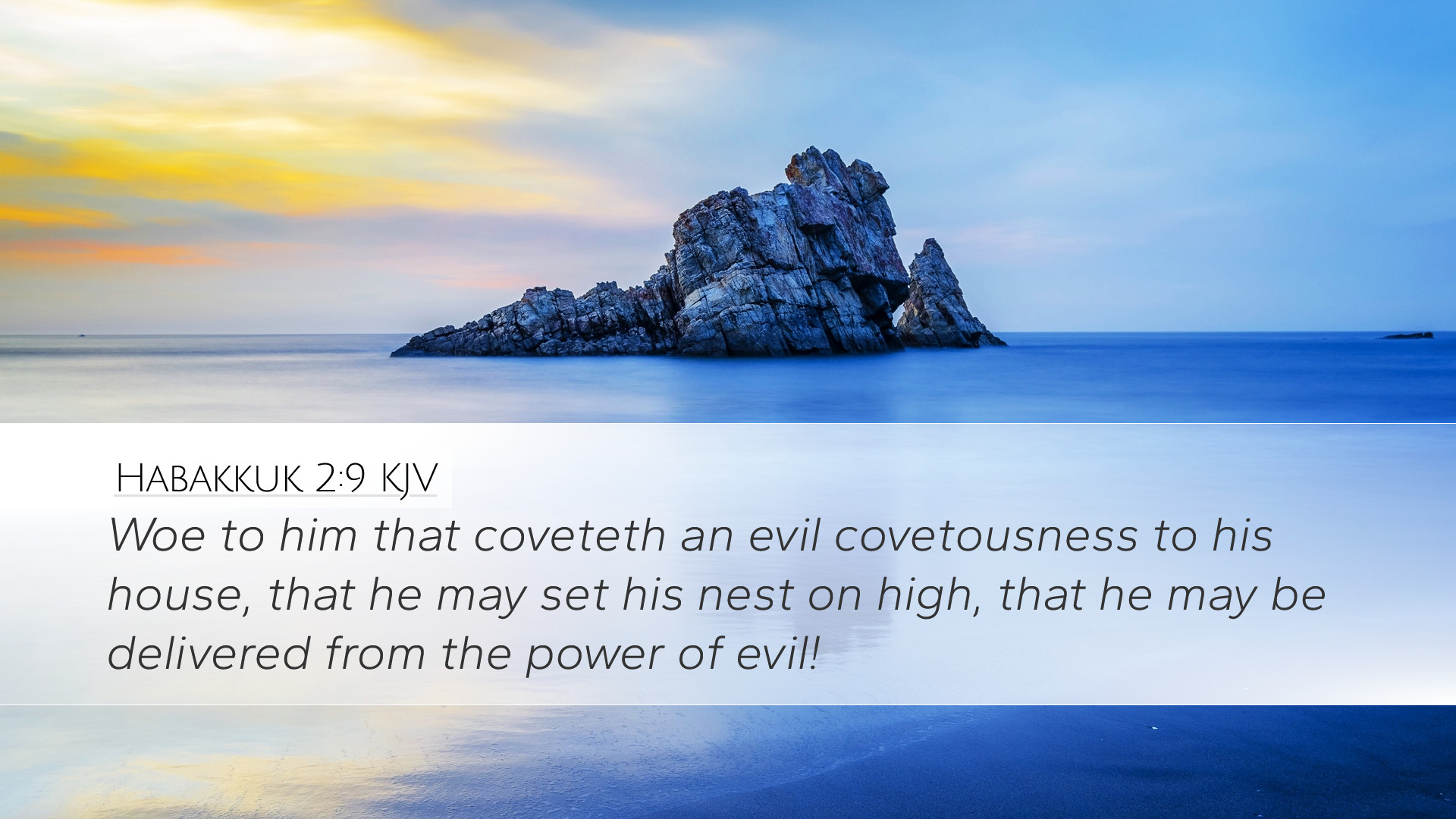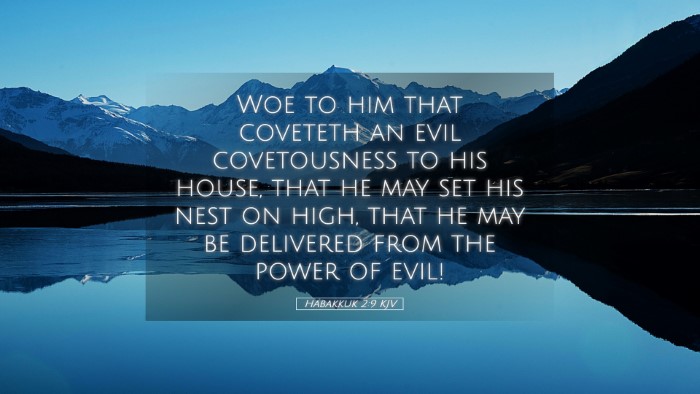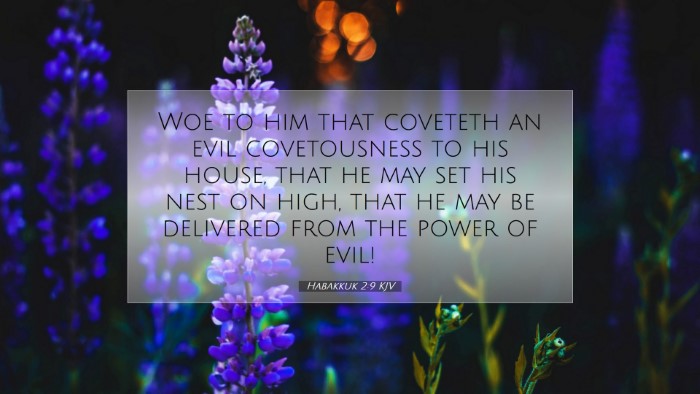Old Testament
Genesis Exodus Leviticus Numbers Deuteronomy Joshua Judges Ruth 1 Samuel 2 Samuel 1 Kings 2 Kings 1 Chronicles 2 Chronicles Ezra Nehemiah Esther Job Psalms Proverbs Ecclesiastes Song of Solomon Isaiah Jeremiah Lamentations Ezekiel Daniel Hosea Joel Amos Obadiah Jonah Micah Nahum Habakkuk Zephaniah Haggai Zechariah MalachiHabakkuk 2:9
Habakkuk 2:9 KJV
Woe to him that coveteth an evil covetousness to his house, that he may set his nest on high, that he may be delivered from the power of evil!
Habakkuk 2:9 Bible Commentary
Commentary on Habakkuk 2:9
Habakkuk 2:9 reads: "Woe to him that coveteth an evil covetousness to his house, that he may set his nest on high, that he may be delivered from the power of evil." This verse comes as part of a larger prophetic warning against the injustices perpetrated by the Chaldeans, indicating the moral and spiritual stagnation that often accompanies unchecked ambition and greed.
Introduction to the Context
The book of Habakkuk is a unique prophetic text characterized by its dialogue between the prophet and God. Habakkuk grapples with the reality of evil and injustice in the world, questioning God's fairness in allowing such circumstances to exist. This verse gives voice to God's judgment against those who exploit and oppress others for personal gain.
Exegesis of the Verse
In this verse, the prophet Habakkuk pronounces a woe—a term frequently used in prophetic literature to denote impending judgment—against those who engage in harmful avarice. It serves as a critical reflection on the perilous nature of greed and the lengths to which individuals will go to safeguard their own interests.
Woe to Him
The opening phrase, "Woe to him," signals a weighty declaration of condemnation. As noted by Matthew Henry, this expression highlights God's disapproval of the behaviors in question, emphasizing the seriousness of the consequences that await the greedy. The transition from general condemnation to specific actions reveals the operational dynamics of sinful ambition.
Evil Covetousness
"Evil covetousness" here indicates a desire that is not merely greedy but morally corrupt. Albert Barnes explains that such covetousness is fueled by a longing for wealth that leads to oppressive practices. This term suggests that one's ambition not only defies ethical standards but also harms others in pursuit of self-serving goals.
To His House
This phrase indicates a personal appropriation of resources that belong to others or to the communal good. Adam Clarke points out that this indicates the lengths to which the greedy will go to attain security for themselves, often at the expense of justice and righteousness.
Setting His Nest on High
The metaphor of "setting his nest on high" signifies both an attempt to avoid accountability and a misguided belief in self-preservation. Matthew Henry notes that this reflects a desire for safety and stability that is sought through unjust means, representing a perverse interpretation of success.
Delivered from the Power of Evil
The notion of being "delivered from the power of evil" demonstrates a profound misunderstanding of true deliverance. Albert Barnes elaborates that such a person seeks deliverance through their riches and power, misleading themselves into believing that they can escape judgment through their wealth.
Theological Implications
This verse speaks to profound theological truths about divine justice and human culpability. The woe pronouncement serves to remind readers that God sees the intentions behind one's actions. The seemingly successful may not escape divine judgment, regardless of their earthly achievements.
Greed and Accountability
The exploitation inherent in the verse warns against the illusion of security tied to possessions. Adam Clarke argues that true safety can only be found in God, contrasting worldly ambition with the eternal stability offered through faithfulness and righteousness. The insatiable desire for more can lead to losing everything in the sight of God.
Justice and Deliverance
This verse raises critical questions about what constitutes real deliverance. The greed that might shield one from immediate consequences will ultimately fail to protect before God's ultimate judgment. Matthew Henry emphasizes that God's justice will prevail, exposing the hollow foundations upon which the ambitions of the greedy rest.
Practical Applications for the Modern Reader
For pastors, students, and theologians, this passage offers rich insights into the ethics of ambition and personal integrity. It challenges the contemporary reader to reflect on their own pursuits, urging an examination of motives and a commitment to justice and the well-being of others.
4 Points of Reflection
- Examine Personal Ambitions: Reflect on how personal desires may stray from a righteous path and the impact these might have on community and justice.
- Value of Justice: Embrace a commitment to justice that aligns with God’s character, rejecting any form of exploitation.
- Understanding True Security: Consider where true security lies; is it in wealth or in a relationship with God?
- Accountability: Acknowledge that all actions will be brought before God, and pursue integrity in daily decisions.
Conclusion
In Habakkuk 2:9, the prophet encapsulates a timeless warning that resonates deeply within the complexities of human ambition and divine justice. As we navigate our aspirations, may we heed the call to pursue righteousness above all, ensuring our pursuits promote justice, kindness, and humbly walking with God.


